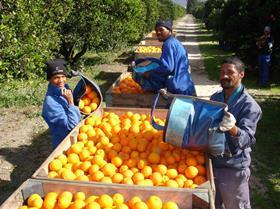
The South African citrus sector has reacted strongly to this week's Copa-Cogeca statement, which urged the EU Commission to put in place safety measures to protect against contaminated imports of citrus fruit coming in from South Africa.
The Copa-Cogeca statement followed a European Food Safety Authority (EFSA) report warning that there was a high risk of importing the highly contagious disease Black Spot (CBS).
'To date the only two official Pest Risk Assessments have proven that CBS is not a risk to the EU citrus industry, because fruit is not a pathway for the disease and because CBS does not take hold in a Mediterranean climate,' explained South African Citrus Growers Association spokesman Justin Chadwick.
'We would agree wholeheartedly with Copa-Cogeca if it had been determined that CBS was a risk to the EU,' Chadwick continued. 'This is not only the dominant scientific view; it is also corroborated empirically by the fact that CBS is not present in the EU after over 100 years of trade with South Africa or in any region with a Mediterranean climate in countries such as South Africa or Australia.'
Chadwick noted that it was not correct for Copa-Cogeca to state that 'no control measures currently exist'.
'CBS is listed as a quarantine organism under the EU Plant Health Directive,' he said. 'South African exports are subject to official inspections for CBS. This is despite the fact that according to international scientific opinion citrus fruit imports pose no risk.
'Therefore, I am sure that Copa-Cogeca would join us in requesting that the CBS risk status be confirmed as a matter of priority – a call that South Africa has been making for some time,' Chadwick outlined. 'Ascertaining the actual risk posed by CBS to EU citrus production through the fruit trade should be the priority. This needs to be done, as requested by South Africa, through the International Plant Protection Convention.'
Chadwick explained that the uncertainty created around the risk of CBS would have consequences for the citrus industry in Europe.
'Should Southern Hemisphere citrus imports be disrupted this will have a knock-on effect for the Northern Hemisphere season; lost shelf space for the citrus category and customers turning to citrus alternatives,' he warned. 'This would have a detrimental effect on employment throughout Europe, but most importantly in the southern EU member countries. The socio-economic consequences of trade disruption without any scientific justification will not only be felt in South Africa. All citrus exporting and importing countries around the globe are interdependent.'



